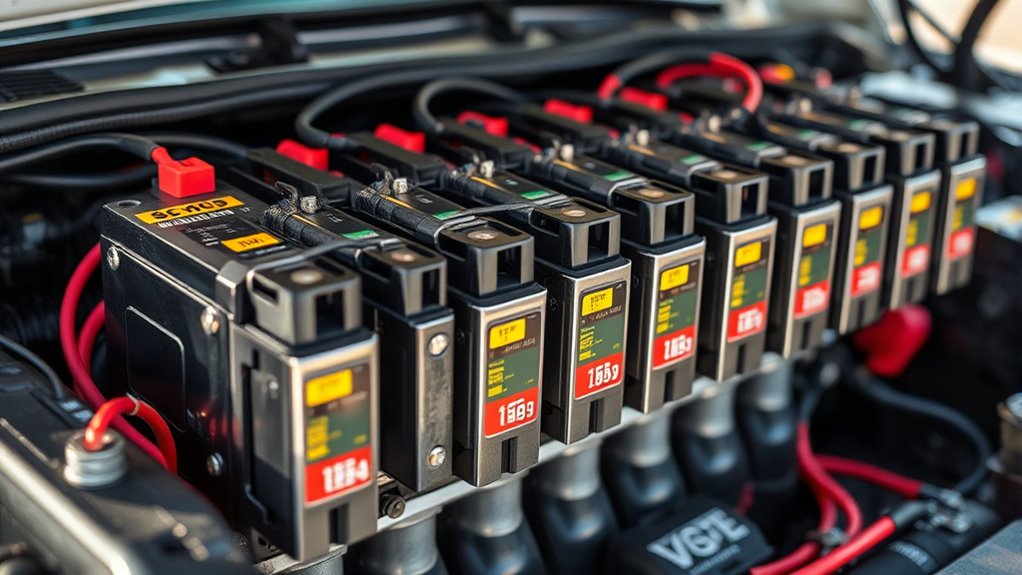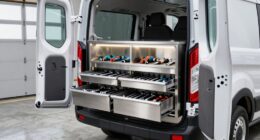If you’re looking for reliable power for your van in 2025, I recommend checking out the top battery isolators like the Dual Battery Isolator Kit, VEVOR, Spartan Power, and Stinger models. These options handle high currents, are weatherproof, and turn on automatically to keep your batteries charged and safe. Each comes with essential installation features and rugged durability. Stick around to discover which one best fits your van’s needs and enjoy seamless power management.
Key Takeaways
- Top battery isolators feature automatic voltage sensing to prevent battery drain and ensure reliable power management.
- Many models are waterproof, dustproof, and rugged, ideal for outdoor, off-road, and marine van applications.
- High current ratings (up to 700A) support demanding setups like RVs, trailers, and high-power accessories.
- Easy DIY installation with included components and clear instructions simplifies system setup and maintenance.
- Advanced models offer system monitoring features like voltmeters and automatic control for optimal performance.
Dual Battery Isolator Kit 12V

If you’re looking for a reliable dual battery isolator that’s easy to install and works in rugged conditions, the Dual Battery Isolator Kit 12V is an excellent choice. It features a 140 Amp voltage-sensitive relay that automatically activates at 13.3V and disconnects at 12.8V, ensuring your batteries charge efficiently without draining each other. Its compact design fits easily under the hood or in tight spaces. Built with durability in mind, it’s IP65-rated for water, dust, and vibration resistance. The kit includes all necessary components and clear instructions, making DIY installation straightforward. Plus, it’s backed by a 12-month warranty for peace of mind.
Best For: DIY enthusiasts, boaters, RV owners, and off-road vehicle users seeking a reliable, easy-to-install dual battery isolator for rugged conditions.
Pros:
- Automatic voltage-sensitive relay ensures efficient battery charging and prevents drain
- Compact design allows flexible installation in tight spaces or under the hood
- IP65-rated for water, dust, and vibration resistance, suitable for harsh environments
Cons:
- May require basic electrical knowledge for installation
- Does not include a battery monitor or additional accessories for advanced system management
- Limited to 12V systems, not compatible with higher voltage setups
Dual Battery Isolator Kit for 12V Vehicles
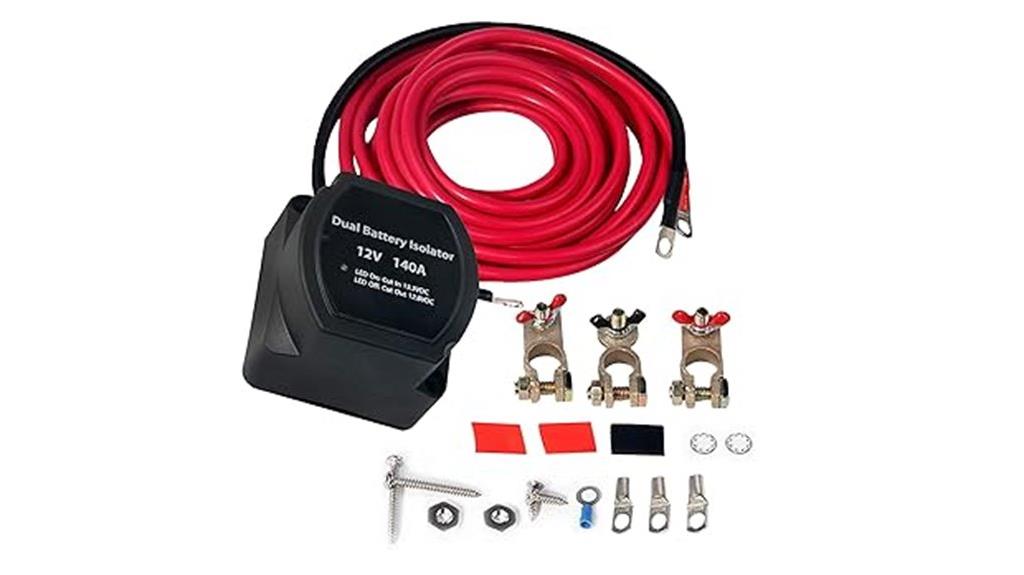
The Dual Battery Isolator Kit for 12V Vehicles is an excellent choice for anyone looking to run accessories without risking their main battery. It features a 12V, 140 Amp voltage sensitive relay that automatically manages battery charging, ensuring your primary battery stays charged and ready to start. Built tough to resist water, vibration, and extreme weather, it’s perfect for trucks, SUVs, ATVs, UTVs, and boats. The kit includes all necessary components—relays, cables, terminals, and instructions—making installation straightforward. Plus, with a lifetime warranty from AA Ignition, you can trust this system to keep your power reliable, no matter where your adventures take you.
Best For: vehicle owners and outdoor enthusiasts seeking a reliable, easy-to-install dual battery management system for trucks, SUVs, ATVs, UTVs, boats, and recreational vehicles.
Pros:
- Automatic battery management with a 140 Amp voltage sensitive relay for reliable power control
- Rugged construction resistant to water, vibration, and extreme weather conditions
- Complete kit with all necessary components and easy-to-follow installation instructions
Cons:
- Installation may require basic electrical knowledge or professional assistance for optimal setup
- Limited to 12V systems; not suitable for higher voltage applications
- Compatibility with very specialized or custom electrical setups may require additional modifications
VEVOR Split Charge Relay Kit, 12V, 6m, Dual Battery Isolator with 140AMP VSR
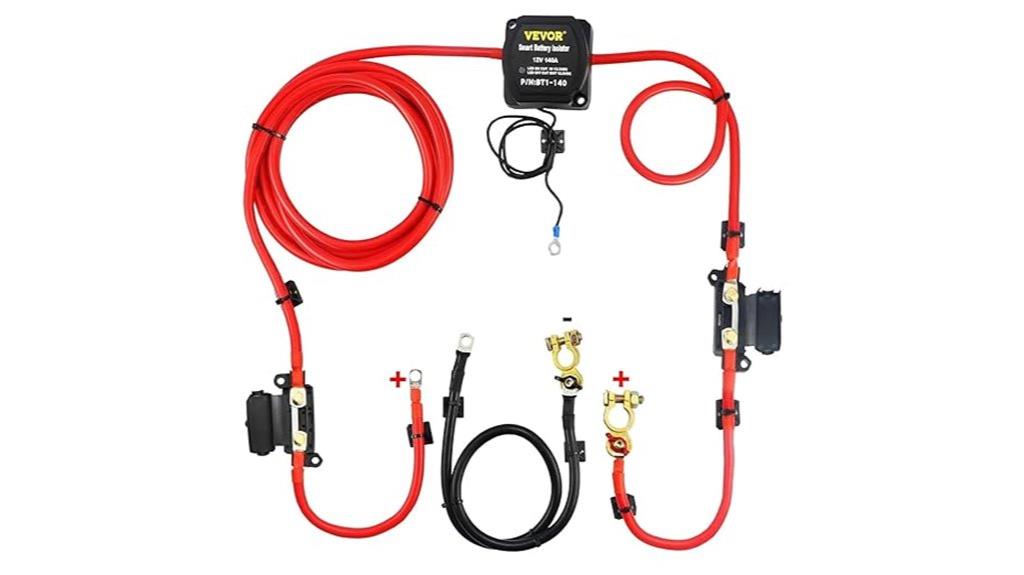
For those needing a reliable solution to manage dual batteries in rugged environments, the VEVOR Split Charge Relay Kit stands out. This 12V kit features a 6-meter cable and a powerful 140AMP VSR, automatically controlling charging between batteries. It engages at 13.3 volts and disengages at 12.8 volts, ensuring your primary battery stays charged and ready. Made from durable shockproof and dustproof plastic, it’s built to withstand harsh conditions. Its IP65 waterproof rating makes it ideal for dusty, wet, and high-vibration environments. Compact and easy to install with complete accessories, it’s perfect for off-road vehicles, RVs, boats, and more.
Best For: off-road enthusiasts, RV owners, and marine users seeking a durable, reliable dual battery management solution in rugged environments.
Pros:
- Automatically manages charging to keep primary battery ready, reducing manual intervention
- Constructed from shockproof, dustproof plastic for enhanced durability in harsh conditions
- Waterproof IP65 rating ensures protection against dust, water, and extreme weather
Cons:
- May require technical knowledge for proper installation in complex electrical systems
- Limited to 12V systems, not suitable for higher voltage applications
- Comes with a 6-meter cable, which may be too long or short depending on specific vehicle setup
Spartan Power Smart Dual Battery Isolator (VSR 12V 140A)

Designed to seamlessly manage dual battery systems, the Spartan Power Smart Dual Battery Isolator (VSR 12V 140A) is an excellent choice for van owners who need reliable power distribution without complex wiring. It automatically transfers charge between two 12V batteries, maintaining system health and preventing depletion. Its straightforward installation process makes setup quick for both DIYers and professionals. Built for safety and durability, it safeguards against overcharging and short circuits. Manufactured in the USA, Spartan Power products are known for quality and reliability, ensuring your vehicle’s electrical system stays protected and ready for any adventure.
Best For: van owners, RV travelers, and off-road enthusiasts seeking reliable, easy-to-install dual battery management solutions.
Pros:
- Seamless automatic charge transfer between batteries, enhancing system efficiency
- Simple installation suitable for DIYers and professionals alike
- High-quality manufacturing in the USA ensuring durability and safety
Cons:
- May require additional wiring or components for full system integration
- Designed primarily for 12V systems, limiting use with other voltage setups
- Slightly higher cost compared to basic isolators without smart features
Stinger SGP32 200 AMP Battery Relay Isolator and Relay
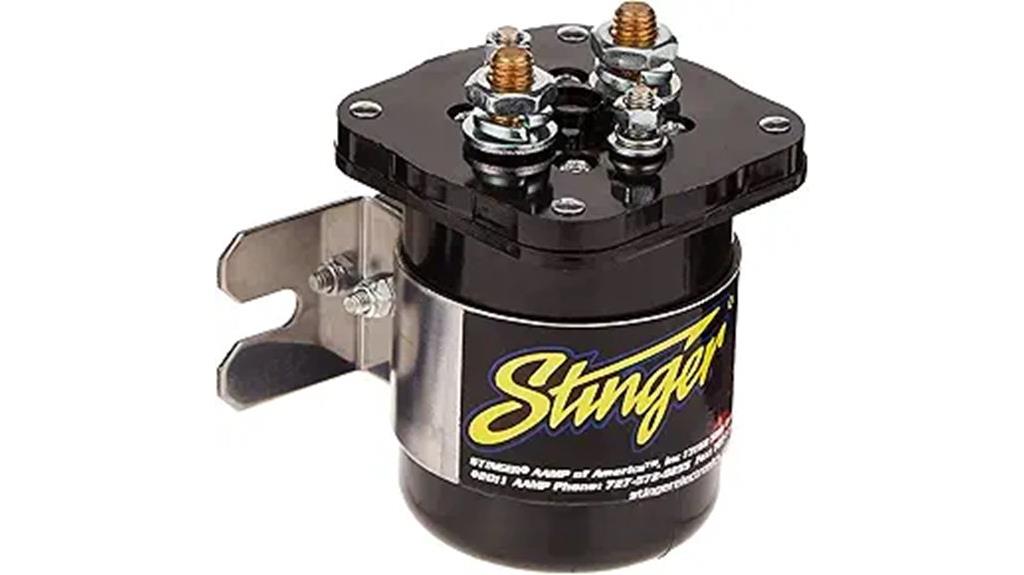
If you’re looking for a reliable solution to prevent primary battery drain while powering accessories, the Stinger SGP32 200 AMP Battery Relay Isolator and Relay is an excellent choice. It automatically connects batteries during vehicle operation and disconnects them when off, ensuring your primary battery stays healthy. With a 200-amp current rating and copper contacts, it handles high-current applications like winches and multiple batteries. Its quick connect terminals make installation straightforward, and the relay’s automatic operation provides peace of mind. This durable, versatile relay is perfect for maintaining power reliability in your van, especially in demanding 12V systems.
Best For: vehicle owners and professionals seeking a reliable, high-current battery isolator to prevent primary battery drain while powering accessories in automotive, commercial, or off-road applications.
Pros:
- Handles high current up to 200 amps, suitable for demanding applications like winches and multiple batteries
- Automatically connects and disconnects batteries based on vehicle operation, ensuring ease of use and protection of the primary battery
- Quick connect terminals facilitate straightforward installation and maintenance
Cons:
- Relatively large size may require additional space for installation
- Maximum switching current of only 1 Amp could limit certain control configurations
- Requires proper wiring and setup to ensure optimal automatic operation
RECOIL 500 Amp Mobile Audio Battery Isolator and High Current Starter Relay
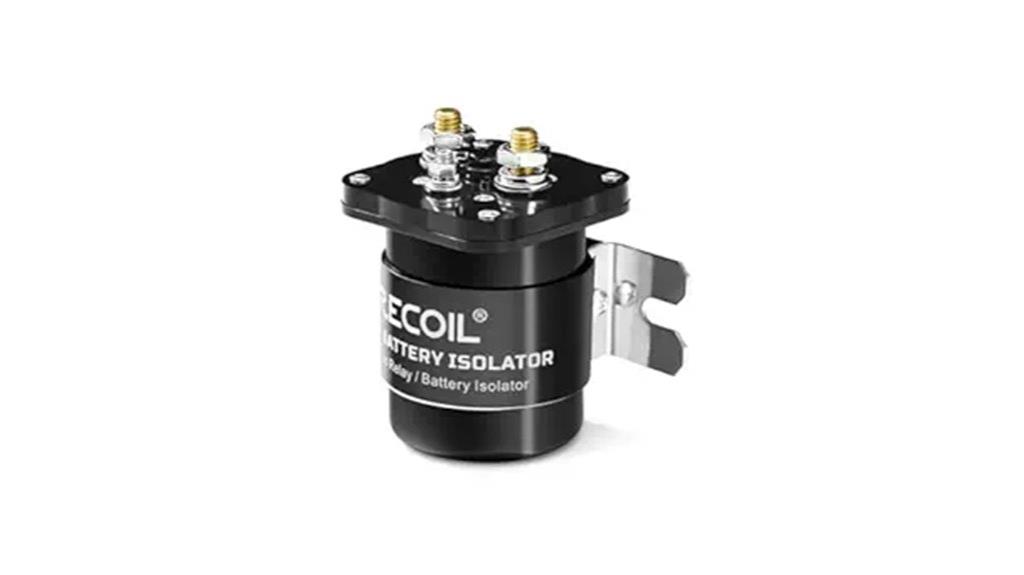
Looking for a reliable solution to prevent battery drain in your mobile audio system or high-current starter setup? The RECOIL 500 Amp Mobile Audio Battery Isolator and High Current Starter Relay is perfect. It handles 500 amps continuously and surges up to 700 amps, efficiently managing high current demands. It prevents power transfer between batteries, protecting your main battery when the engine’s off and extending its lifespan. Unlike traditional isolators, it doesn’t cause voltage drops, ensuring stable power delivery. Built tough with waterproof features, it works reliably in any weather. This device is ideal for safeguarding your batteries during demanding audio or starting applications.
Best For: those with high-current mobile audio systems or demanding starting setups seeking reliable battery protection and stable power delivery.
Pros:
- Handles up to 500 amps continuously and surges to 700 amps for high-demand applications
- Prevents battery drain by stopping power transfer between batteries, extending battery life
- Waterproof and durable construction, suitable for all weather conditions
Cons:
- May require professional installation due to high current handling capabilities
- Potentially more expensive than basic isolators or relays
- Not designed for low-current or standard vehicle applications
Battery Switch Jtron MAX 12-32V DC 300A Cont 450A Isolator

The Battery Switch Jtron MAX 12-32V DC 300A Cont 450A Isolator stands out as an excellent choice for those needing a reliable, high-capacity battery disconnect switch in demanding environments. Made from durable ABS and metal, it features a waterproof cover for added protection. With a continuous rating of 300 amps and an intermittent capacity of 450 amps, it handles high current loads safely. Its compact design makes installation straightforward, and its robust construction ensures long-lasting performance even in extreme temperatures from -30°C to +60°C. Perfect for vehicles, boats, and RVs, this switch provides secure power management and peace of mind.
Best For: individuals and professionals seeking a durable, high-capacity battery disconnect switch for vehicles, boats, and RVs in demanding environments.
Pros:
- Made from durable ABS and metal for long-lasting performance
- Waterproof cover provides enhanced protection against moisture and environmental elements
- High current capacity with 300A continuous and 450A intermittent ratings, suitable for demanding applications
Cons:
- Requires proper installation due to its electrical and mounting specifications
- May be overbuilt for low-current or simple applications
- Limited to DC voltage range of 12-32V, not suitable for higher voltage systems
Dual Battery Isolator Kit 12V 140amp
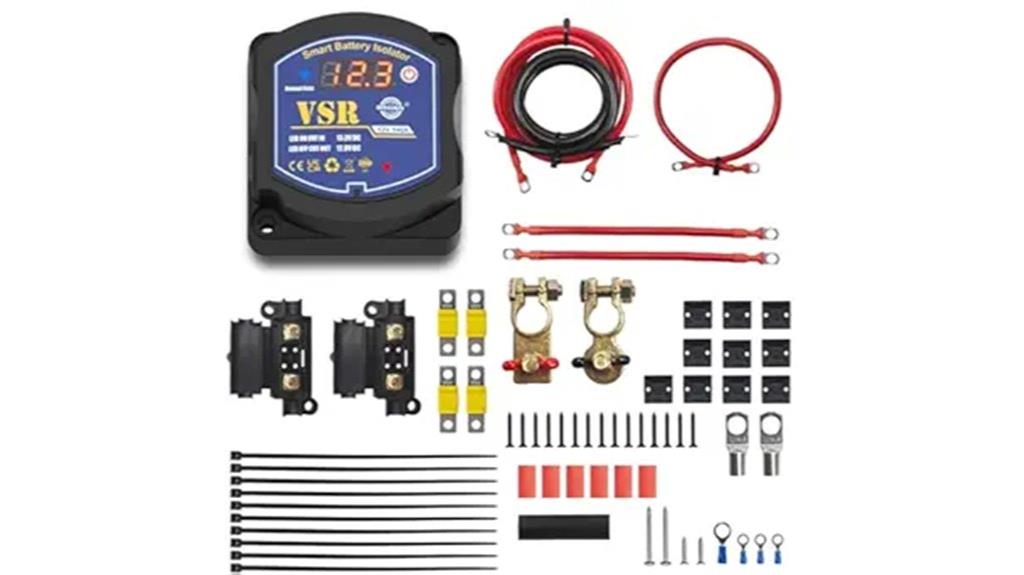
For those seeking a reliable solution to manage multiple batteries in demanding setups, the Dual Battery Isolator Kit 12V 140amp stands out as an excellent choice. It uses a Voltage Sensitive Relay (VSR) to automatically connect or disconnect batteries based on voltage levels—cutting in at 13.3V and out at 12.8V—keeping your main battery charged. It supports manual and auto reverse charging, ensuring your auxiliary battery charges when needed. Built with an IP67 waterproof rating, it resists harsh weather, and with a 140amp capacity, it handles high-demand applications like trailers and sports cars. This isolator enhances battery life and guarantees a stable power supply.
Best For: vehicle, marine, RV, boat, truck, trailer, ATV, and camper owners seeking a durable, high-capacity battery management solution to prevent drainage and ensure reliable power.
Pros:
- Automatic battery management with Voltage Sensitive Relay (VSR) for seamless operation
- Supports high-demand applications with 140amp current capacity
- IP67 waterproof rating ensures reliable performance in harsh weather conditions
Cons:
- Not compatible with lithium batteries, limiting use with modern battery types
- Installation may require technical skill for optimal setup
- Manual and auto reverse charging modes may need user familiarity for effective operation
Smart Dual Battery Isolator 12V 140A for Vehicles and Marine
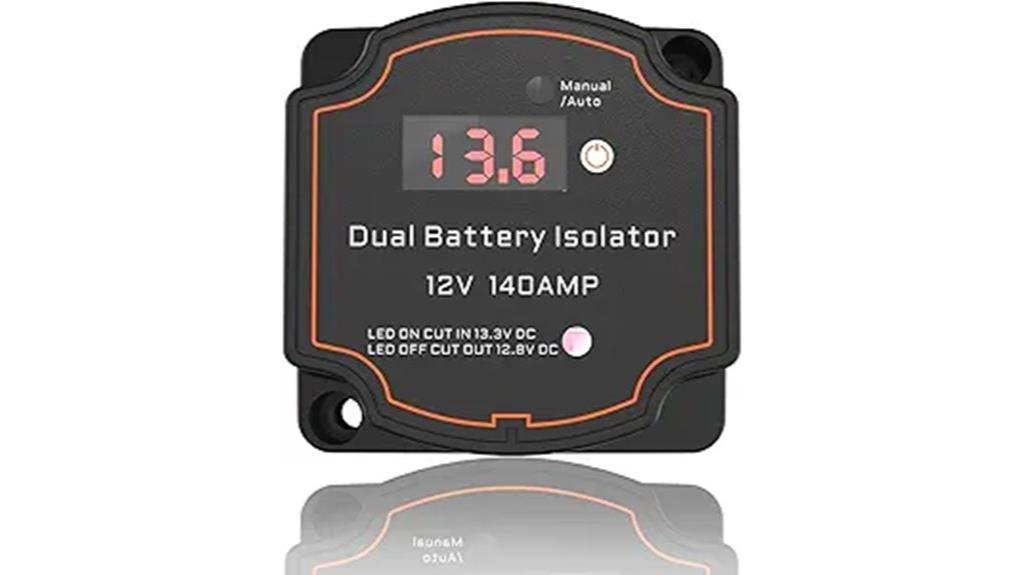
If you need a reliable battery isolator that automatically manages your vehicle’s power system, the Smart Dual Battery Isolator 12V 140A is an excellent choice. It intelligently controls your auxiliary battery based on voltage levels, disconnecting when voltage drops below 11V or exceeds 17V to prevent damage. It allows simultaneous charging from the engine alternator, ensuring both batteries stay topped off. With IP68 waterproof protection, it withstands harsh weather conditions, making it perfect for outdoor use. Plus, the built-in digital voltmeter helps monitor battery status in real-time. Easy to install and compatible with most vehicles and marine systems, it’s a smart upgrade for reliable power.
Best For: vehicle and marine owners seeking an automatic, weatherproof battery isolator to protect and maintain their batteries efficiently.
Pros:
- Automatically manages auxiliary battery connection based on voltage, preventing over-discharge and over-voltage damage
- Waterproof IP68 rating ensures durability in harsh weather and outdoor conditions
- Includes a digital voltmeter for real-time battery voltage monitoring, aiding maintenance and system management
Cons:
- Not compatible with ternary lithium batteries, limiting use with certain advanced battery types
- May require professional installation for optimal setup in some vehicle configurations
- Limited to 12V systems, unsuitable for higher voltage electrical setups
Nilight 12V 140AMP Dual Battery Isolator Voltage Sensitive Relay

If you’re looking for a reliable dual battery isolator that automatically manages charging between batteries, the Nilight 12V 140AMP Voltage Sensitive Relay stands out as an excellent choice. It activates at 13.3 volts and deactivates at 12.8 volts, ensuring your main battery stays charged for starting while simultaneously charging your auxiliary battery. Built with a high-quality casing and silicone seal, it’s IP66 waterproof, resistant to dust, water, and vibrations, making it perfect for harsh environments. Designed for 12V systems, it’s ideal for camper vans, boats, and off-road vehicles, helping you run accessories without draining your main battery.
Best For: vehicle owners and outdoor enthusiasts seeking a durable, automatic dual battery management system for marine, RV, or off-road applications.
Pros:
- Fully automatic operation with activation at 13.3V and deactivation at 12.8V for reliable battery management
- IP66 waterproof rating and silicone-sealed casing ensure durability in harsh weather and off-road conditions
- Compatible with 12V systems, suitable for a variety of vehicles and outdoor setups
Cons:
- Not compatible with lithium batteries, limiting use with modern lithium-based battery systems
- May require additional wiring and installation expertise for optimal setup
- Max current capacity of 140AMP might be insufficient for high-power electrical setups
2PCS Battery Disconnect Switch for Marine and Vehicle Applications
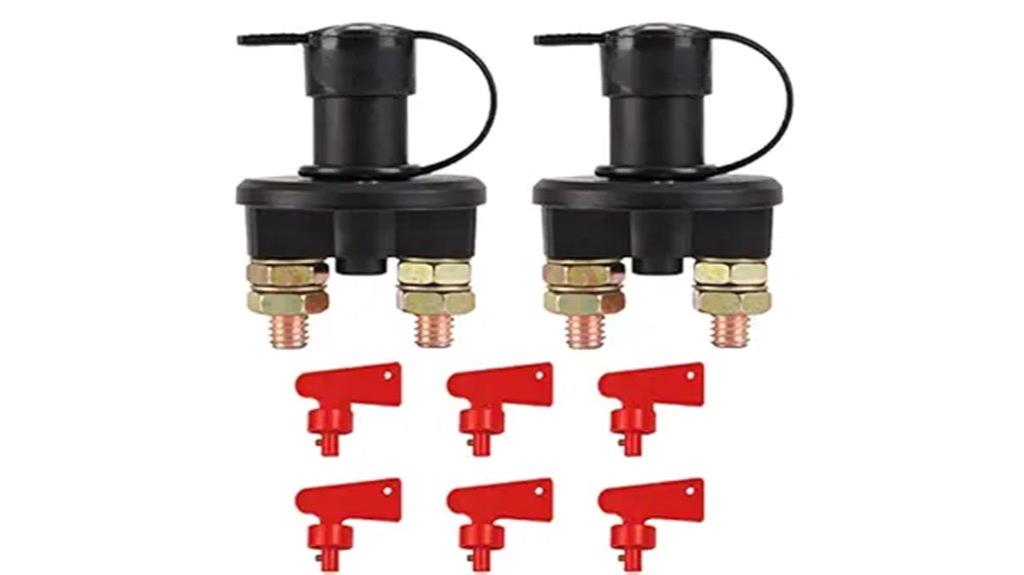
The PCS Battery Disconnect Switch stands out as an excellent choice for boaters and vehicle owners who need a reliable, weather-resistant power cut-off solution. Designed for 12V and 24V systems, it acts as a kill switch to prevent battery drain, enhance security, and simplify maintenance. It includes two switches, waterproof covers, and six keys for added safety. Made with durable copper terminals and stainless steel nuts, it resists rust and corrosion. The weatherproof design ensures longevity in harsh environments. Easy to operate with a simple On/Off toggle, it’s perfect for marine, RV, car, and truck applications, providing dependable power control when you need it most.
Best For: boaters, RV owners, and vehicle enthusiasts seeking a reliable, weatherproof battery disconnect switch for secure power management.
Pros:
- Durable construction with copper terminals and stainless steel nuts for corrosion resistance.
- Weatherproof design with waterproof covers suitable for harsh environments.
- Easy to operate with a simple On/Off toggle and includes multiple keys for security.
Cons:
- May require some technical knowledge for installation in complex electrical systems.
- The size of the switch may be larger than some compact models, requiring adequate mounting space.
- Limited to 12V and 24V systems, not suitable for higher voltage applications.
Stinger SGP35 500-AMP Relay and Isolator , Black
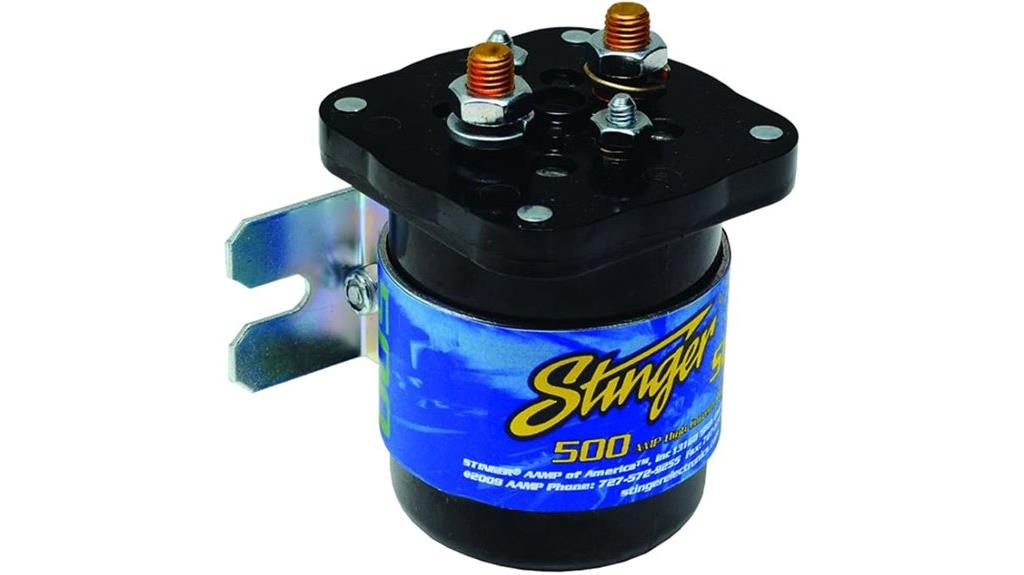
For those needing a high-capacity battery isolator that can handle demanding loads, the Stinger SGP35 500-AMP Relay and Isolator stands out as an excellent choice. Made of water-resistant phenolic plastic, it supports up to 500 amps with a 6000-watt capacity, ideal for high-power applications. Its electromechanical design ensures reliable switching, and the screw connectors make wiring straightforward. Suitable for all 12V systems, it automatically isolates batteries when the ignition is off, protecting your system. With a durable build, a one-year warranty, and positive customer reviews, it’s a dependable solution for keeping your power reliable in any van setup.
Best For: automotive enthusiasts, off-roaders, and marine users needing a reliable high-current relay and isolator for secondary battery systems and high-power accessories.
Pros:
- Supports up to 500 amps and 6000-watt capacity for demanding loads
- Water-resistant phenolic plastic housing ensures durability in harsh environments
- Easy wiring with screw connectors and reliable electromechanical switching
Cons:
- Heavier than smaller relays at 1.65 pounds, which may impact installation space
- Requires 12V DC power, limiting use in systems with different voltage standards
- May be overkill for low-current applications where smaller relays suffice
Dual Battery Isolator Kit (VSR) for 12V Battery Setup
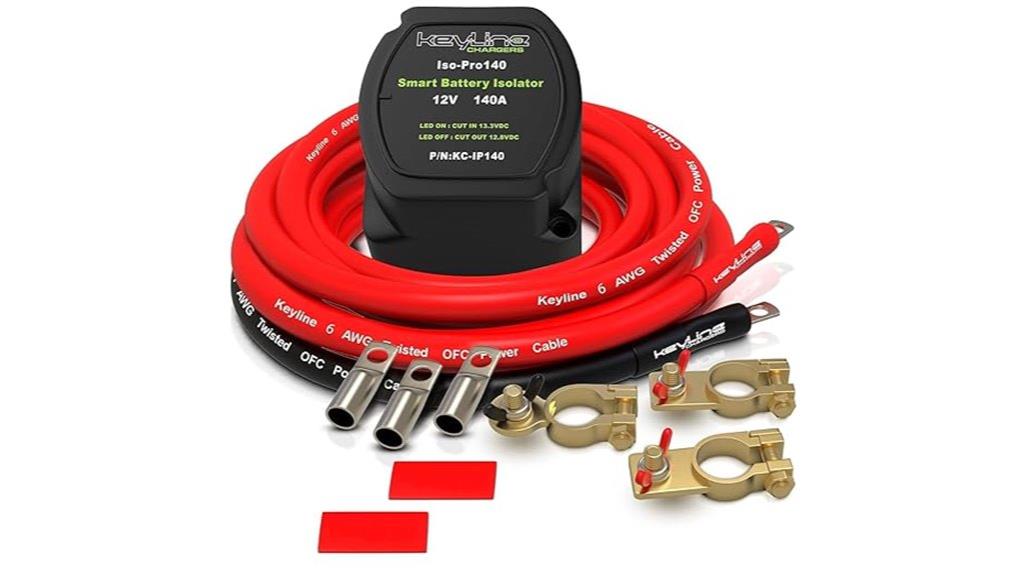
A dual battery isolator kit with a voltage-sensitive relay (VSR) is an ideal choice for anyone looking to reliably manage multiple batteries in their van setup. This 12V system, rated at 140 amps, automatically connects or disconnects batteries based on voltage levels—activating at 13.3V and disengaging at 12.8V—to guarantee maximum charging and prevent drain. Its compact size allows easy installation under the hood or elsewhere, and its solid-state, IP65-rated design withstands water, dust, and vibrations. Plus, it comes with everything you need for DIY installation, backed by a warranty for peace of mind.
Best For: DIY enthusiasts, off-grid adventurers, and vehicle owners seeking reliable, efficient dual battery management with easy installation and durability.
Pros:
- Automatic voltage sensing ensures optimal battery charging and prevents drain without manual intervention
- Compact and rugged IP65-rated design withstands water, dust, and vibrations for reliable performance in extreme conditions
- Complete DIY kit with all necessary components and step-by-step instructions simplifies installation for users of all skill levels
Cons:
- May require basic electrical knowledge for proper installation and setup
- Not suitable for systems exceeding 140 amps or non-12V configurations
- Limited to automatic operation; some users might prefer manual control options
Factors to Consider When Choosing a Battery Isolator for Vans
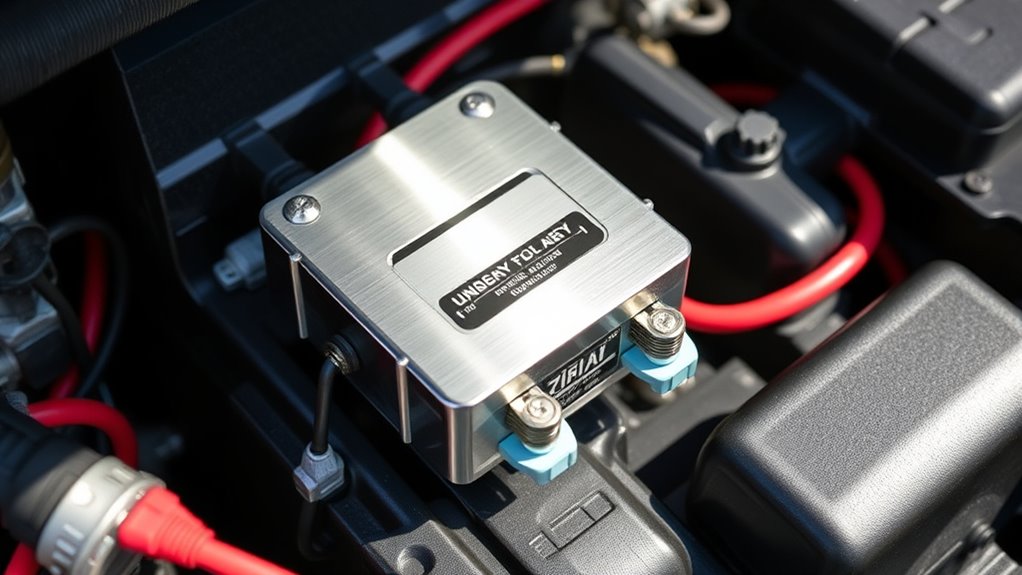
When choosing a battery isolator for your van, it’s essential to take into account compatibility with your vehicle type and your power needs. You also want to make sure it’s weatherproof, easy to install, and matches the voltage and amperage requirements of your system. Let’s look at these key factors to help you pick the best option.
Compatibility With Vehicle Type
Choosing the right battery isolator for your van depends heavily on your vehicle’s specific type and setup. You need to guarantee the isolator matches your van’s voltage and current needs, typically 12V and up to 140 amps. Check if the size and mounting options fit your engine bay, interior, or battery compartment constraints. It’s also vital to select an isolator rated for your environment—outdoor or off-road models should have IP65 or IP68 ratings for water and dust resistance. Additionally, confirm compatibility with your battery type, whether lead-acid, AGM, or lithium, since some isolators aren’t suitable for certain chemistries. Finally, verify that installation points align with your existing wiring and battery configuration for a safe, seamless fit.
Amperage Capacity Needs
To guarantee your van’s battery isolator can handle your system’s power demands, you need to carefully consider its amperage capacity. First, determine the maximum current draw of all accessories and appliances, then select an isolator with an amperage rating that exceeds this total for safe operation. Consider the continuous amperage capacity, ensuring it can handle peak loads without overheating or failure. For high-power devices like winches or large audio systems, opt for an isolator rated at 200 amps or more to accommodate surge currents. Additionally, verify the isolator’s maximum switching current to handle the combined startup current of multiple batteries and devices. Matching the isolator’s amperage capacity with your system’s battery output helps prevent overloads and ensures reliable performance over time.
Waterproof and Weatherproof
Ensuring your van’s battery isolator can withstand outdoor conditions is just as important as selecting the right amperage capacity. A waterproof or weatherproof isolator protects against water ingress, dust, and moisture, which are common in outdoor environments. An IP65 or higher rating means it can handle water jets and rain without losing functionality. Weatherproof models feature sealed enclosures and corrosion-resistant materials, making them durable against snow, humidity, and harsh weather. Proper waterproofing prevents short circuits, electrical failures, and damage, substantially extending the device’s lifespan. Choosing a weatherproof isolator guarantees reliable operation whether you’re off-road, at sea, or in unpredictable weather. This resilience ensures your power system remains intact and dependable, regardless of outdoor conditions.
Installation Complexity Level
The installation complexity of a battery isolator varies depending on its design and features, so it’s important to contemplate how much technical skill you’ll need. Some units are straightforward plug-and-play, making installation quick and easy for DIY enthusiasts. Others require more complex wiring and multiple connections, which can be challenging if you’re less experienced. Check if the isolator comes with detailed, step-by-step instructions—this can make a big difference in simplifying the process. Additionally, consider if you’ll need extra tools like crimpers, heat shrink tubing, or mounting brackets, as these can add to the complexity. Conversely, if the isolator has waterproof or dustproof ratings, you might need extra sealing or protective measures during installation, especially in exposed environments.
Voltage and Power Specifications
Choosing the right battery isolator means paying close attention to its voltage and power specs. First, verify the isolator’s voltage rating matches your system—usually 12V or 24V—to prevent issues like overvoltage or undervoltage. Next, check its maximum amperage capacity to handle the combined current draw of your batteries and accessories without overheating or voltage drops. It’s also important to confirm the voltage sensing thresholds; for example, activation at 13.3V and disengagement at 12.8V help optimize charging and prevent battery drain. Additionally, consider the isolator’s ability to support surge loads during high-current situations, ensuring reliable operation during charging or accessory use. Compatibility with your vehicle’s electrical system is vital, so double-check these specs to keep your power setup safe and efficient.
Durability Against Environment
Since vans often face tough environmental conditions, selecting a battery isolator with strong durability features is crucial. I recommend choosing one with an IP65 or higher waterproof rating to guard against water, dust, and vibration. A solid-state isolator made from shockproof and dustproof materials will stand up to off-road bumps and exposure to harsh elements. Check that the enclosure is corrosion-resistant, like marine-grade plastics or coated metals, especially in humid or salty environments. It’s also essential that the components operate reliably within temperature ranges from -30°C to +60°C to prevent failure during extreme cold or heat. Finally, look for models with environmental sealing and vibration damping to ensure consistent performance despite continuous vibrations and weather fluctuations.
Automatic vs. Manual Control
When deciding between automatic and manual battery isolators for your van, understanding how each type operates can help you choose what best fits your needs. Automatic isolators use voltage sensing to connect or disconnect batteries without user input. They typically engage at around 13.3V and disengage at 12.8V, ensuring batteries stay healthy and charging is optimized. This makes them ideal if you want a set-it-and-forget-it solution, especially when you’re not constantly monitoring your system. Manual isolators, on the other hand, require you to physically flip a switch to control the connection. They offer full control, which is useful if you prefer managing your batteries based on specific needs or maintenance routines. Your choice depends on whether you prioritize convenience or direct operational control.
Frequently Asked Questions
How Do Battery Isolators Prevent Battery Drain in Vans?
Battery isolators prevent drain in my van by ensuring only the active battery supplies power to accessories, while the auxiliary battery stays charged. They automatically disconnect the batteries when the vehicle’s engine isn’t running, stopping current from flowing back and draining the batteries. When I start the engine, they reconnect, allowing both batteries to charge. This process keeps my batteries healthy and ready for use without risking a dead battery.
What Maintenance Is Required for Battery Isolators in Vehicles?
Think of your battery isolator as the gatekeeper of your vehicle’s power. I check it regularly for corrosion or loose connections, ensuring it functions smoothly. Cleaning terminals with a wire brush and applying a protective spray keeps it in top shape. I also inspect wiring for wear and replace any damaged parts promptly. Regular maintenance is like tending a garden—it keeps everything flowing and prevents unexpected breakdowns.
Can Battery Isolators Be Installed DIY by Vehicle Owners?
Yes, I believe most vehicle owners can install battery isolators themselves if they’re comfortable with basic wiring and electrical work. I recommend carefully reading the installation instructions and watching tutorial videos beforehand. Make sure to disconnect the battery before starting, and take your time to double-check all connections. If you’re unsure or uncomfortable, it’s always safer to consult a professional to ensure proper installation and avoid any electrical issues.
What Are the Safety Features to Look for in a Battery Isolator?
Safety features are a must, even if you think you’re a wiring wizard. Look for built-in fuses or circuit breakers—because nothing says “safe” like protecting your van’s electrical system from overloads. Also, a good isolator should have thermal protection to prevent overheating and indicators to show proper operation. Trust me, a little safety goes a long way—because nobody wants a smoky surprise in their van adventure.
How Do Temperature Variations Affect Battery Isolator Performance?
Temperature variations can considerably impact a battery isolator’s performance. When it’s cold, my isolator might struggle to activate properly, reducing efficiency and risking power loss. Conversely, high temperatures can cause overheating, leading to potential damage or failure. I always verify my isolator is rated for the climate I operate in, and I monitor it regularly, especially during extreme weather, to maintain reliable power and prevent issues.
Conclusion
I know choosing the right battery isolator might seem overwhelming, but don’t worry—any of these top picks will keep your van’s power reliable. Remember, it’s not just about the most expensive or feature-packed model, but the one that fits your needs and setup. With a solid isolator, you’ll enjoy peace of mind on every trip, knowing your batteries won’t drain unexpectedly. So go ahead and pick the best for your adventure!
